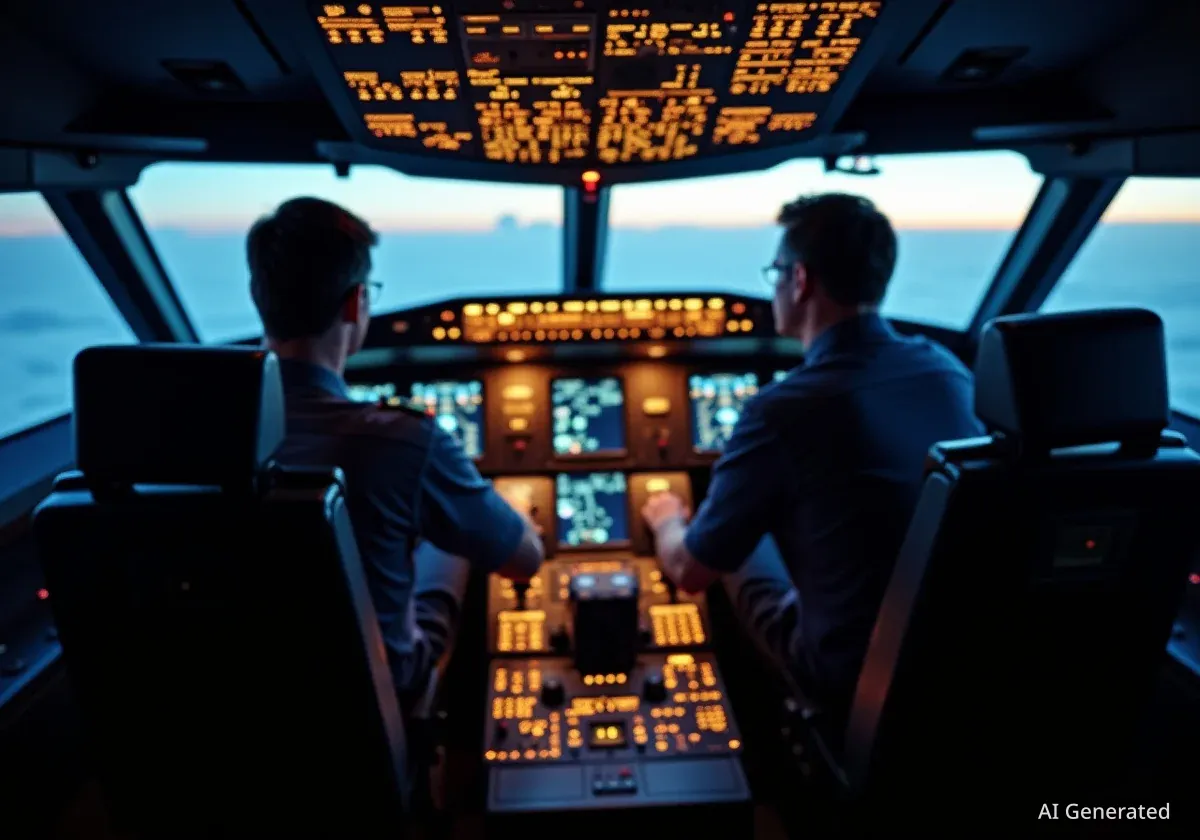A recent study reveals growing concerns about air safety in Europe. The research indicates that cost-cutting measures and increased staff pressure within the airline industry are weakening safety standards. Many employees feel unable to report safety issues or disclose fatigue due to fear of negative career consequences.
Key Takeaways
- Over half of airline workers hesitate to raise safety objections.
- Cost-cutting and profit focus are weakening safety layers.
- Fatigue is a major issue, with many feeling unable to report it.
- Cabin crew face pressure for in-flight sales, creating role conflict.
- Precarious contracts and a 'culture of fear' affect worker well-being.
Airline Staff Face Increased Pressure and Fatigue
Pilots and cabin crew across European airlines are experiencing significant pressure to work extended hours. Many feel compelled to conceal signs of tiredness, potentially compromising safety. This information comes from a major study conducted by Ghent University in Belgium.
The study highlights that airlines' focus on cost reduction and profit generation has "systemically weakened" overall safety protocols. A large number of employees, often exhausted, report feeling too intimidated to challenge management decisions that might impact safety.
Key Statistic
More than half of all respondents in the survey stated they did not feel able to "modify instructions" from management based on safety objections. This marks a notable decline from a similar 2014 study where 82% of pilots felt confident in doing so.
The research involved 6,900 airline workers. It also uncovered specific concerns among cabin crew. These employees reported feeling pressured to prioritize onboard sales of items like perfumes and alcohol. This commercial focus can conflict with their primary role of ensuring passenger safety and well-being.
Pandemic Accelerates Decline in Working Conditions
The COVID-19 pandemic significantly worsened working conditions in the aviation sector, according to the report. A generation of experienced senior pilots left the industry during this period. They were often replaced by younger, less expensive workers who were more likely to accept flexible or precarious contracts.
These new contract types can undermine workers' ability to maintain high safety standards. The shift in workforce demographics and employment terms contributes to the broader safety concerns identified by the researchers.
"The shift toward in-flight sales responsibilities risks diluting the safety-centric nature of cabin crew work, creating role conflict, psychosocial strain, and legal ambiguities," wrote the study's authors, Yves Jorens and Lien Valcke. "While commercial pressures may make such practices attractive for airlines, they come at a cost to worker wellbeing, safety standards and professional integrity."
Around 30% of pilots admitted they sometimes hesitated to make safety-critical decisions. This hesitation stemmed from a fear of potential negative consequences for their professional careers.
The 'Swiss Cheese Model'
Participants in the study used the "Swiss cheese model" to describe the situation. This model illustrates how multiple layers of protection can fail, leading to an accident. Workers suggested that safety layers are being "systematically weakened (poking extra holes) for financial reasons, leaving the final barrier to accidents dependent on chance and luck rather than robust protection."
Pressure Mounts Amid Low-Cost Carriers and Traffic Rebound
The rise of low-cost carriers has intensified competition in the airline industry. Combined with the post-pandemic rebound in air traffic, crew members are under increasing pressure. They often face longer shifts and fewer opportunities for adequate rest. This environment directly impacts their ability to perform safely.
The researchers found that 42% of all crew members believe management prioritizes scheduling efficiency over safety considerations. This imbalance creates a challenging work environment for front-line employees.
Fatigue and Reluctance to Report
Fatigue remains a significant and ongoing issue for airline staff. Many employees feel they cannot request rest, even when they are tired or unwell. This reluctance to report fatigue is widespread.
Nearly one in three pilots and almost half of all cabin crew members confessed they sometimes hesitate to declare themselves unfit to fly. This highlights a culture where reporting unfitness is seen as a risk rather than a necessity.
- One anonymous crew member stated: "I feel like a criminal just for being sick."
- Another reported a European base manager shouting: "You're here to fucking sell."
These direct quotes illustrate the intense pressure and perceived lack of support from management. Such experiences contribute to a negative workplace culture.
Impact on Employee Well-being and Mental Health
Many employees expressed feeling undervalued by their airlines. One respondent noted their airline "treats me as a [number] and nothing else. There is no regard for mental wellbeing or physical wellbeing. It prides itself in profit over human wellbeing. It has a poor toxic workplace culture and a culture of fear. This fear originates from the amount of people they sack for stupid reasons."
Well-being Statistics
- 68% of all crew fell below the positive threshold for mental health.
- 78% of all crew considered themselves "dehumanized."
These figures underscore the severe impact of current working conditions on the mental and emotional health of airline staff. The lack of care for personal goals and well-being is a recurring theme.
Concerns with Atypical Employment Contracts
The study also raised concerns about atypical employment practices. These include short-term contracts, self-employment, or agency work, as opposed to direct employment by airlines. These groups reported worse working conditions and lower levels of well-being.
Younger age groups and those working in Eastern European nations were more likely to hold atypical positions. For example, 41% of workers under 21 were in atypical employment. In Eastern European countries, 52% of crew members had atypical contracts.
The authors noted that work intensity has increased over the past decade. This is due to digitalization, automation, and higher passenger volumes. This leaves less time for crew members to effectively perform their tasks, adding to the pressure.
'Management by Fear'
The study's authors claimed a "concerning trend is the increasing use of 'management by fear,' where wellbeing is not explicitly linked to safety outcomes." They warned that atypical work, which created risks a decade ago, now affects the entire sector.
According to Jorens, "Labour conditions are no longer just a social issue – they have an impact on safety, wellbeing and fatigue that are all interrelated. Without fair and stable employment, we cannot sustain a safe and resilient European aviation sector."
Ignacio Plaza, Secretary General of the European Cockpit Association, an umbrella group for pilot unions, issued a warning: "The race to the bottom on contracts now touches every pilot – and when pilots are under pressure, passengers feel the risk, too. These abuses demand urgent investigation."





